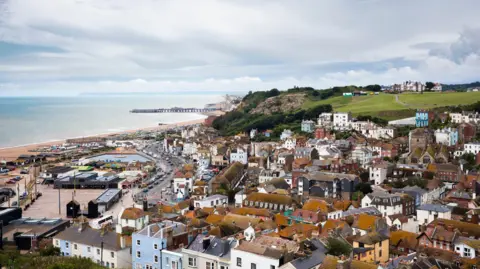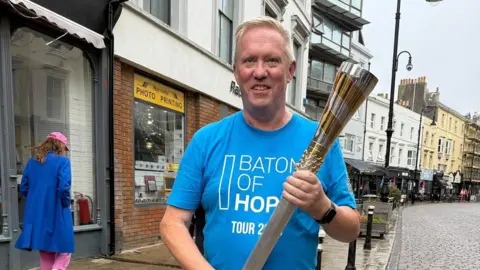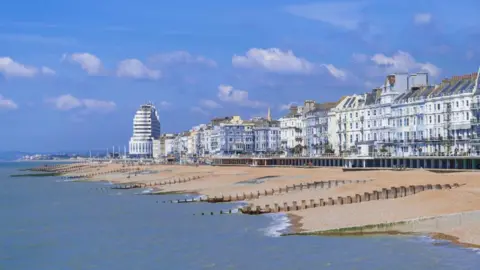Joshua Askew,South East and
George Carden,in Hastings
 Getty Image
Getty Image“Our community is fantastic,” said Barry Ashley. “There are loads of great things going on in the town.
“When people get together, they are strong and resilient. There’s no choice but to be.”
Barry Ashley runs the not-for-profit Grumpy Cook cafe in Hastings, East Sussex.
His cafe is located in the 14th most deprived local authority in England, according to recently released data by the Ministry for Housing, Communities and Local Government.
At the Grumpy Cook people are able to pay what they can afford or even eat for free in a way that he said gave them dignity if they were struggling to make ends meet.
 Barry Ashley
Barry Ashley“The place is on its knees,” he told the BBC. “You can see it by all the boarded-up shops.”
Mr Ashley, in his 60s, said he regularly saw children hungry and without proper clothing.
He blamed previous government policies of austerity for slashing public services and local authority budgets, but added officials continued to neglect the area.
“People feel forgotten,” he said.
A Hastings Borough Council spokesperson said the East Sussex town was a “great place to live, work and visit, but like many coastal towns, it faces its own unique challenges”.
They added that over recent years Hastings had received “significant investment” from central and local government.
Several ongoing projects, such as revitalising the town centre, would ultimately ensure decent, well-paid jobs and increased health and wellbeing, as well as economic prosperity, the spokesperson continued.
‘Not the full picture’
Jordan Walid, who grew up in Hastings, said the town was a “good environment”.
“It has been a smooth ride,” he said.
He said he “totally disagreed” with the government deprivation data, which did not reflect the reality on the ground.
Mr Walid said community spirit was “alive” in Hastings.
“Everyone likes each other. It is a friendly place.”
Lucy Brett, another Hastings resident, added she was surprised by the data.
“I would not have thought it’s that bad,” she said.
 Getty Images
Getty ImagesYasmin Ibison, of the Joseph Rowntree Foundation, said the high level of deprivation reflected a combination of unemployment, housing costs, low incomes and poor transport infrastructure.
She also said that changing holiday habits had led to economic decline in coastal areas like Hastings.
Ms Ibison told the BBC deprivation could profoundly impact many aspects of people’s lives.
“Across the UK… there are millions of people who are living in poor-quality homes, working poor-quality jobs, and are unable to afford life’s essentials… like food, heating and clothes.”
She said highly deprived areas were also much more likely to be socially and politically disconnected, with people having lower levels of trust and feeling a loss of control over where they live.
‘Things could be better’
One neighbourhood to the north-east of Hastings was ranked as the seventh most deprived in England.
The area is sandwiched between the suburbs of St Helen’s and Ore and covers much of the housing on and around Chiltern Drive, Malvern Way and Ivyhouse Lane.
But Ms Ibison told the BBC that the government data does not necessarily tell the whole story.
“In Hastings, there are examples of fantastic community initiatives and organisations doing amazing work,” she said.
“Part of how we tackle some of the challenges of living in deprived areas is about involving communities in decisions and listening to their needs.”
This can enable residents to “really foster that sense of agency, ownership and pride in [their] local area,” she added.
Darren Cripps, another Hastings resident, said the town had “a lot of potential, but no one seems to do anything with it”.
“Things could be a lot better,” he added.
The Ministry of Housing, Communities and Local Government and the Conservative Party have been approached for comment.


